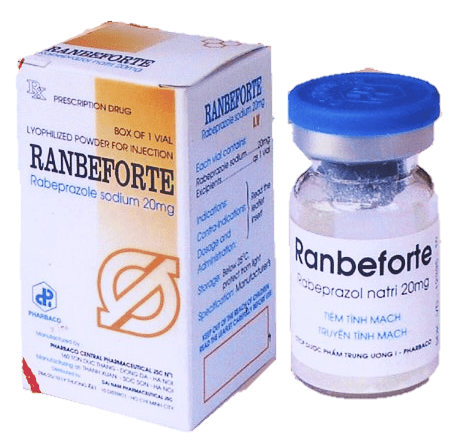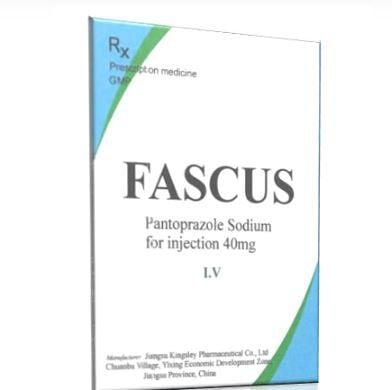This is an automatically translated article.
What is Hycid-20 drug? Hycid-20 belongs to the group of gastrointestinal drugs with the main ingredient omeprazole, which is commonly used to inhibit gastric secretion by blocking the proton pump of the gastric parietal cells. The drug is often indicated in the treatment of peptic ulcers or gastroesophageal reflux disease.
1. Effects of Hycid-20
Hycid-20 drug has the main ingredient omeprazole which is a specific inhibitor that works by blocking the enzyme system of Hydrogen- Potassium Adenosine Triphosphate, also known as the proton pump of gastric cells. The effect of the drug Hycid-20 on the last stage of acid secretion, a single dose of omeprazole 20mg/day will rapidly inhibit gastric secretion due to any stimulus.
Hycid-20 is usually indicated in the following cases:
Treatment of peptic ulcers Zollinger-Ellison syndrome Gastroesophageal reflux disease (GERD) Contraindications of Hycid-20 include patients Hypersensitivity to omeprazole, esomeprazole or other benzimidazole derivatives as well as to any of the excipients of Hycid-20.
2. Dosage of Hycid-20 drug:
Hycid-20 is usually taken orally and is not crushed or chewed. Depending on the purpose of use, the drug Hycid-20 has different doses, specifically as follows:
Relieve symptoms of acid indigestion: 10-20 mg/day for 2-4 weeks Treatment of gastroesophageal reflux : 20mg x 1 time / day for 4 weeks, add 4-8 weeks if not completely cured. A dose of 40 mg/day may be used if esophagitis persists. Maintenance dose after healing of esophagitis is 20mg once daily and for acid reflux is 10mg/day Treatment of peptic ulcer: 20-40mg/day for 4 weeks for duodenal ulcer and 8 weeks with peptic ulcer. Maintenance dose: 10-20 mg once daily Treatment of gastric ulcers caused by non-steroidal anti-inflammatory drugs: 20 mg/day and is also used for prevention in patients with a history of gastrointestinal injury requiring continue treatment with non-steroidal anti-inflammatory drugs Treatment of Zollinger-Ellison syndrome: 60 mg x 1 time/day. Most patients are effectively controlled at 20-120 mg/day, but doses above 80 mg/day should be divided into 2 doses. No dosage adjustment is necessary for patients with hepatic impairment. Patients with hepatic impairment take 10-20 mg. /day No dose adjustment is required in elderly patients
3. Side effects of the drug Hycid-20:
In some patients when using Hycid-20, side effects may occur such as:
Headache, drowsiness, dizziness Nausea, vomiting, diarrhea or constipation, bloating Insomnia, confusion, dizziness, fatigue Urticaria, pruritus, rash Transaminase elevation (reversible) Sweating, peripheral edema Hypersensitivity reactions: angioedema, fever, anaphylaxis Reversible confusion, agitation, depression Feelings, hallucinations in the elderly, especially severe illness, hearing disorders Gynecomastia in men Hepatitis jaundice, encephalopathy in liver failure Bronchospasm Muscle and joint pain Interstitial nephritis
4. Be careful when using Hycid-20:
Some general notes when using Hycid-20 include:
Before using omeprazole for patients with peptic ulcers, it is necessary to exclude the risk of malignancy because when using Hycid-20 drug can mask symptoms. The use of Hycid-20 and atazanavir is not recommended. Hycid-20 can reduce the absorption of vitamin B12 by reducing or lacking hydrochloric acid. Omeprazole is an inhibitor of CYP2C19, so it should be taken into account. risk of drug interactions with drugs metabolised via CYP2C19. There have been reports of severe hypomagnesemia in patients taking PPIs for at least 3 months and in most cases for 1 year, whose condition improved with magnesium supplementation and PPI discontinuation accordingly. serum magnesium levels should be checked before initiating PPI therapy. Long-term use of PPIs such as Hycid-20 may slightly increase the risk of hip, wrist and spine fractures, mainly in humans old age or in the presence of other risk factors. Patients at risk of osteoporosis must be cared for and supplemented with vitamin D and calcium. Although omeprazole has not been shown to cause malformations and fetal toxicity, Hycid-20 should not be used for pregnant women. is in the first 3 months Omeprazole is not recommended in nursing women
Please dial HOTLINE for more information or register for an appointment HERE. Download MyVinmec app to make appointments faster and to manage your bookings easily.













